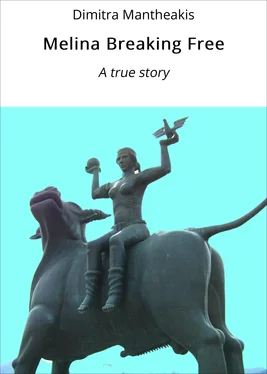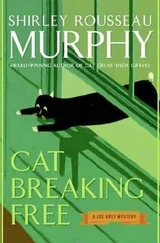Vaggelio thought for a few moments about what would follow and then stoically accepted the situation. It wasn’t as if this would be the first time that everyone would have been gossiping about her and that her amorous activities would be the talking point in all of the town cafes. Coming to terms with the state of affairs she turned and started to stroke Stelios’ crotch to excite him so he could take her on another journey to a sensual place that had become the very reason for her existence.
When Vaggelio was done with her sexual activities with Stelios, sated, she started homeward. The only thing that bothered her was that to go home she would have to cross the square. She knew that at this moment the cafes were all full and that the voyeurs would already have broadcast the news to the others, leaving out of course, their own reaction to the spectacle they had witnessed.
“We caught Stelios on top of Vaggelio in the Ayios Fanouris’ wood!” They said, hurrying to let everyone present in on the stirring details.
The news travelled like fire in a tinder dry forest. And just wait until the evening when all of those present would be back home for dinner and would let their wives know about the incident! It would be then that the whole village would be abuzz. The women would stigmatize, for the umpteenth time, the immoral behavior of Vaggelio, saying “the woman has no shame and makes her children objects of ridicule! Let the Lord protect us from females like that!”
The truth is that if the village had other equally skilful nurses like Vaggelio the housewives wouldn’t have let her past their front doors. But she had such a light hand coupled with the depth of her nursing experience and knowledge, that the old, the children and the sick all needed her skills! Two or three housewives who tried to replace her with other nurses deeply regretted it when they saw the replacements’ lack of expertise and rough bedside manners when dealing with the family member who was ill. Her eagerness, her infinite patience with bad-tempered patients and her gentle manner towards all those who were ill, as well as her immediate response to any call for help, whether by day or night, made her irreplaceable. They may have scorned her and been “ashamed on her behalf” as they liked to say in their conversations, but in their hour of need they always called for Vaggelio, diluting, of necessity, their scorn and contempt for her.
Paulina and Dina had arrived at the front of the cafes and didn’t miss a word of the mockery and vulgar remarks coming from the café clientele directed at Vaggelio. Paulina was so agitated that her heart almost stopped. Her cheeks, from shame, became awash in a deep crimson colour and tears brimmed in her eyes. She wanted the pavement to split open up and swallow her up to save her from the public humiliation; she craved to be the victim of a sudden heart attack and drop down dead to stop the filth that she was hearing, dirt that her own mother had put in the tormentors’ mouths with her unbridled behaviour. Her wishes weren’t realised. Her mother was now in front of her with the men cat-calling and mocking her and Paulina felt herself overflowing with hate. Hate for her mother and hate for her unrelenting village compatriots. Vaggelio, beaming, as if she had not heard a word of what her fellow villagers were saying, said to the young girls. “Where to my girls? Out for a walk?”
Dina replied, “Yes!” Paulina, with her eyes overflowing, cast a bitter look at her mother, a look containing a world of accusation, and, skirting her, she ran off to hide at home, leaving the two others to stare after her. With an embarrassed “Goodbye” Dina walked away and Vaggelio started on her way home. When she arrived she saw Paulina sobbing loudly on the settee. She put her hand on her daughter’s shoulder. Paulina turned from her and pushed it away in disgust.
“Don’t you dare touch me! Don’t you touch me!” shrieked the young girl. “You made a fool of me with your filthy actions! I don’t want to know you! I’m ashamed to have you for a mother!”
Vaggelio did not react to Paulina’s violent outburst. “Let her talk! She’s still young!” she said to herself. “When she grows up, she will understand what nature is!” Vaggelio identified her own insatiable passion with the desires of other people, considering that everyone felt the same pressing demands of the flesh that she did but that the others were hypocritical, concealing their true nature from others with a mask of righteousness and abundant insincerity. The use of their own body was their God-given right Vaggelio felt regarding her own expressions of passion. To have sex was for her a completely natural function since she was in the prime of her life and was deaf to criticism, to mockery, to contempt and the unending gossip around her. She knew that she could not tame her body that regularly rebelled, demanding to instantly couple with a male, no matter what difficulty lay before her to achieve this.
“Let them look at their own mess!” she muttered whenever a new piece of gossip was making the rounds and the village was buzzing about her. “If I opened my mouth, many of these “respectable” homes would be wrecked” she said to herself. The only thing that bothered her was that her children were growing up and were reacting intensely to the bitter gossip, but she had no way to calm them and to make them accept her way of life. On the other hand she had no intention of curbing her sexual activities because they were far beyond her control. Men were the beginning and end of everything in her life, a panacea for the uncontrollable desires that, when they took over, made her sick with longing.
Dina, Paulina’s friend, returned home, her melancholy mood reflected in her eyes. She felt infinite pity after observing her friend’s bitterness during the episode in the square despite not having quite understood what all the fuss was about and why the men were saying rude words to Paulina’s mother, Vaggelio. “What did she do to them to make them so nasty to her?” the girl wondered. “Did she kill their fathers or mothers?”
Much as she searched in her mind she couldn’t find an answer that justified the virulence of the public attack against Vaggelio. Her mother, seeing Dina’s dark mood, asked her, “What happened Dina to upset you? Didn’t you like the dresses in the shops, or was it that we can’t afford to buy one. You know we don’t have money for extras, my child.”
“No, no!” the young girl replied. “There’s nothing wrong. I didn’t even think of buying the dress. It’s just that I am tired and I realised just now that I haven’t drawn the map of Magnesia Province for class, and I am too tired to do it!”
Under no circumstances would Dina embarrass her friend by describing to her mother the unfortunate incident in the square. There was also the risk that her mother would get angry and not allow Dina to go out in public with her fellow student. She, however, was very attached to Paulina and did not want to be deprived of her companionship. Dina rushed to her desk and sat down to draw, trying to put out of her mind the events that had shaken her up that afternoon.
Mary, the chemist’s daughter, went by her father’s pharmacy to meet him and accompany him home. She always enjoyed this mid-day walk in his company because they had the opportunity to talk, despite his telling her off often for things that she got up to because of her restless nature which was diametrically opposed to the impression given by her innocent and reserved facial expression. In spite of the fact that she had been smacked often whenever she had gone beyond the limits of “proper behavior” she bore him no malice. She knew that it was her fault and that her parents had to discipline her. When she became stubborn and words had no effect her tongue became as sharp as a razor, as her mother would observe, since the young girl would frequently talk back, and then a slap or two would be enough to bring her to order, until the next time, and the next.
Читать дальше












